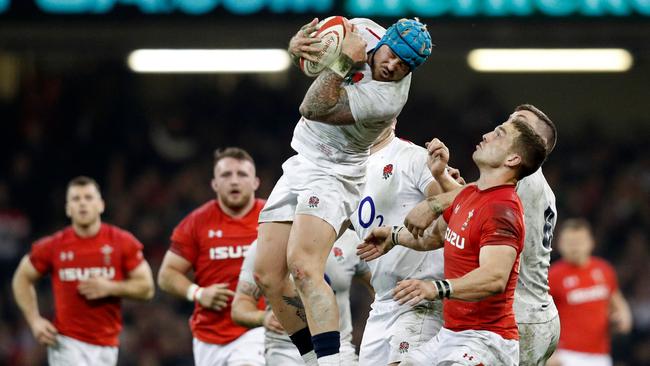Radical proposal to play Bledisloe Cup matches in February, Nations Championship
In the biggest shake-up of the calendar since the sport turned professional, rugby could soon compete with cricket during the summer in a plan synchronise the game around the world.

Rugby
Don't miss out on the headlines from Rugby. Followed categories will be added to My News.
Bledisloe Cup matches in February? That is a radical proposal being considered under a World Rugby push to align the international calendar.
The idea is to run The Rugby Championship and Six Nations in sync, as part of the revived Nations Championship, as the finale to a season that would mirror cricket and be played over our summer.
World Rugby held discussions about the proposal on Monday night and will continue talks in coming weeks to revolutionise the game’s schedule and bring in much-needed revenue.
Super Rugby returns! Watch every game of Super Rugby Aotearoa and Super Rugby AU Live & On-Demand on Kayo. New to Kayo? Get your 14-day free trial & start streaming instantly
The most seamless structure for the Nations Championship – rejected by northern unions last year but back on the table due to the economic collapse caused by COVID-19 – is to start the season in September/October with inbound Tests for southern teams.
For instance; Ireland, France and Scotland could tour Australia, before the Wallabies head north in November for Tests against England, Italy and Wales.
All Tests would count towards points on the Nations Championship ladder.

After the Christmas break, teams would return for TRC and Six Nations where again every Test would count towards points on the global tournament ladder, with the team at the top of the table after the final round crowned champions.
This means the Wallabies could be hosting the All Blacks for a Bledisloe clash in late January or early February in the midst of a searing Australian summer.
Playing Test matches in 40 degree heat and on the back of a pre-season with no club games will be a huge challenge for the southern nations.
However, it also means that all teams including the Wallabies, All Blacks and Springboks players have one continued run in the national team without breaking up for Super Rugby games.

This can be advantageous to national coaches, who can plan an unbroken campaign without the distraction of club duties, where different training methods, loads, positional changes and player output can be vastly different to what is required in the Test arena.
The greatest issue all teams would face under this proposal is reuniting after the Christmas break and attempting to continue the momentum they’d built.
Rugby fans would have to get used to the idea of a 2021/22 season like in cricket, as opposed to a Test schedule run over a calendar year.
The importance of running the north and south internationals in unison is to ensure the Nations Championship is played at the same time rather than an ad hoc situation to suit each hemisphere.

The narrative of the tournament when all teams are playing at once will be easy to sell, and each weekend will see Test matches take on added importance due to positions on the table – a factor that is lacking now where internationals outside the TRC and Six Nations are merely played to fill a World Rugby quota and deliver a financial windfall.
However, the ongoing uncertainty regarding COVID-19 and the travel required for such a Nations Championship mean it is highly unlikely to start this year.
That means the proposed 2020 TRC, to be played in a hub most likely in Australia, could be followed by another TRC in early 2021, before the Nations Championship begins at the end of next year.
RUGBY MUST RIDE ITS CASH COW FOR ALL ITS WORTH - Julian Linden
The solution to fixing rugby’s outdated global calendar is staring the sport’s bungling administrators right in the face — but they still can’t see it.
Instead of listening to fans and giving them more of what they want, out-of-touch bureaucrats are wasting precious time by looking at playing Test matches in summer or inventing a global league that will take almost a year to decide a winner.
What they’re forgetting is rugby already has a “winner winner, chicken dinner” event that makes an absolute motza. It’s called the Rugby World Cup.

The third-biggest sports event on the planet, the game’s governing body treats its jewel in the crown like a Rolls-Royce parked in a garage, taking it for a spin only once every four years.
That’s lunacy for an ailing code that talks a good game about wanting to spread the gospel but keeps hiding its light under a bushel.
If there’s one lesson to be learnt from the COVID-19 pandemic, it’s that sports administrators need to think big and act bold. For rugby, that means holding the RWC every two years.
Commercially, it’s a no-brainer because the tournament is a financial behemoth that just keeps getting bigger and bigger.
Officials are still calculating the enormous profits from last year’s RWC in Japan because it surpassed all expectations, smashing the previous records from the 2015 edition in England, which generated an economic output of $4.2 billion, created 34,000 jobs and sold almost 2.5 million tickets.
The players love it, the standard of play is better and rugby fans the world over have made it clear they just can’t get enough of the RWC.

More than 400,000 international visitors from 170 different countries travelled to the first RWC in Asia, proving how easily the sport can break into new frontiers when given the chance, while at the same time underlining how shamefully slow the sport’s blazers have been to recognise those opportunities.
But the penny still hasn’t dropped for the game’s officials.
If they persist with their antiquated four-year cycle, it’ll be a least another quarter of a century before the RWC returns to the world’s most populated region and more than a decade before it heads to the United States.
That’s administrative madness on an industrial scale but what else would you expect from an organisation that first entertained the idea of a World Cup in the 1950s but didn’t get it off the ground until 1987.
The lame arguments for sticking with the existing four-year cycle have been blown apart by the coronavirus pandemic because the notion of sports administrators keeping their biggest event in cotton wool is ludicrous.
Does anyone think the Melbourne Cup or the Super Bowl or Wimbledon would be more successful if they were held less often?

Has anyone suggested the Ashes or the Ryder Cup — which are both held every two years — are in danger of overexposure?
Even the Olympics is held every two years — alternating between Summer and Winter Games — while football has an array of continental championships to fill the gaps between its World Cup.
Rugby is falling behind so needs to get with the program and double down on the events fans want because even the best traditions that are worth preserving can do with some innovations.
That includes fast-tracking Japan and Fiji into an expanded Rugby Championship, reviving the Grand Slam tours and shifting the British and Lions tours to a different time in the cycle to make way for the only reliable cash cow that can save the game.
Originally published as Radical proposal to play Bledisloe Cup matches in February, Nations Championship



